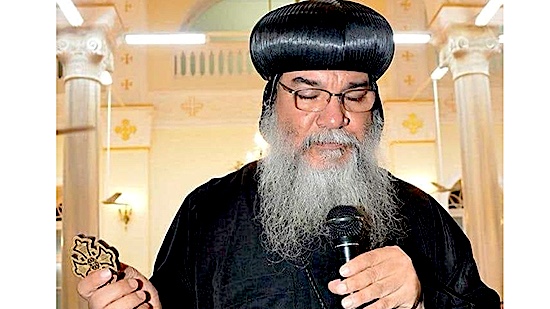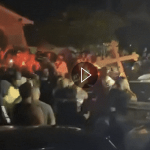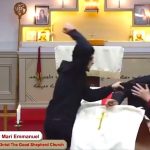By Coptic Solidarity –
(UPDATED on April 26)
His Grace Bishop Makarios of Minya has reassured everyone that calm has been restored to Al-Fawakhir village in Minya, and that a damage assessment is underway to compensate Coptic residents affected by recent attacks carried out by extremists. The attacks were sparked by a “rumor” about the construction of a church in the village.
Bishop Makarios’s Initial Tweet
On Tuesday evening, April 23, Bishop Makarios took to Twitter to express his grave concern regarding the ongoing attacks on Coptic homes in Al-Fawakhir village. He stated that a significant number of homes had been burned down and residents were prevented from leaving. He further mentioned that the authorities had been informed of the anticipated attack and had promised to take action.

The Attack
Extremists pelted Coptic homes with stones and chanted slogans, setting fire to several houses amidst the screams of women and children. The attack continued for hours before security forces arrived.
The magnitude of the fire was such that it could be seen from miles away.
Al-Fawakhir village (including hamlets around it) is home to several hundreds of Christians.
Damage Control
Minya security forces, accompanied by the Deputy Governor of Minya, moved in to cordon off the village and its streets. Reinforcements were deployed from the Minya Security Directorate. Additionally, civil defense forces were present and managed to extinguish some of the fires set by the extremists. No casualties were so far reported.
In a subsequent tweet, Bishop Makarios announced that security forces had arrived, regained control of the situation, apprehended the instigators and perpetrators, assessed all damages, and that state agencies would compensate the affected individuals and hold the perpetrators accountable. He concluded by stating that calm had been restored to the village and prayed for God’s protection over Egypt.
Update
In another recorded message, Bishop Makarios clarified (on April 25) that there was no church in that village and the surrounding hamlets (which are situated on the western-most edge of Minya, bordering the desert) and consequently, a priest from the nearest village-church would visit the village occasionally to hold service in one of the villagers’ houses. A few days before the breakup of the violence, some (Muslim) locals “suspected” that a house would be converted into a permanent church. Authorities sent a committee to inspect the place and ensured that no such “conversion” was taking place, nor being planned. Yet, local fanatics started agitating the populace and initiated the violence. Even after clamping on the violence, agitations continued.
The bishop reiterated that local authorities assured him that culprits would be held accountable, and damaged properties would be repaired or compensated for.
Recurring Pattern of Attacks
The events in Al-Fawakhir village, Minya, bear a striking resemblance to previous incidents in the same governorate, including those in Al-Khaiyary (September 2023), Manzafat Zaafarana (January 2024) in Abu Qurqas, and Al-Azib (December 2023) in Samalut. In each instance, the attackers have imposed their will, leading to the closure of the construction site and preventing the completion of the church, even if it was licensed.
The recent attacks on Copts in Al-Fawakhir village, Minya, highlight the ongoing challenges faced by religious minorities in Egypt. While the exact details surrounding the incident are still being investigated, it is evident that the attacks were triggered by rumors about the construction of a church in the village. These rumors, often fueled by anti-Christian sentiment, have unfortunately become a common pretext for violence against Copts in Egypt.
A Pattern of Violence
The attacks in Al-Fawakhir are not isolated incidents. In recent years, there has been a disturbing increase in sectarian violence targeting Copts in Egypt. These attacks have ranged from property damage to arson and even murder. The underlying causes of this violence are complex and multifaceted, but they often stem from a combination of religious extremism, social discrimination, and political manipulation.
The Role of Rumors
Rumors about church construction have played a particularly insidious role in inciting violence against Copts. These rumors, often spread through social media or word-of-mouth, can quickly ignite tensions and mobilize mobs. In some cases, the rumors may be entirely fabricated, while in others, they may be based on distorted or incomplete information.
Addressing the Root Causes
To effectively address the issue of violence against Copts in Egypt, it is crucial to tackle the root causes that fuel this intolerance. This includes promoting equality of citizens, combating religious extremism, and addressing social inequalities that can contribute to marginalization.
Ensuring Accountability
It is also essential to ensure that those responsible for these attacks are held accountable. This requires prompt and impartial investigations, fair trials, and appropriate punishment for perpetrators. Impunity for such crimes only serves to embolden the perpetrators and perpetuate a cycle of violence.
Protecting Religious Freedom
Protecting the religious freedom of all citizens is fundamental to a just and equitable society. The Egyptian government must take concrete steps to safeguard the rights of Copts and all other religious minorities. This includes ensuring their freedom of worship, expression, and assembly.
The Role of the International Community
The international community also has a role to play in addressing this issue. By raising awareness of the plight of Copts in Egypt and advocating for their rights, the international community can help to create a climate where tolerance and respect for all prevail.
In conclusion, the attacks on Copts in Al-Fawakhir village serve as a stark reminder of the challenges faced by religious minorities in Egypt. Addressing this issue requires a multifaceted approach that tackles the root causes of intolerance, promotes interfaith understanding, ensures accountability, and protects religious freedom for all. The international community can also play a constructive role in advocating for the rights of Copts and other minorities in Egypt.






[…] According to one report, […]
[…] According to one report, […]
[…] On Apr. 23, in al-Fawakhir village, more than 500 Muslims savagely attacked and torched the homes of Christians due to a rumor that a church was to be constructed in the […]